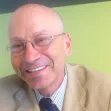Walkability
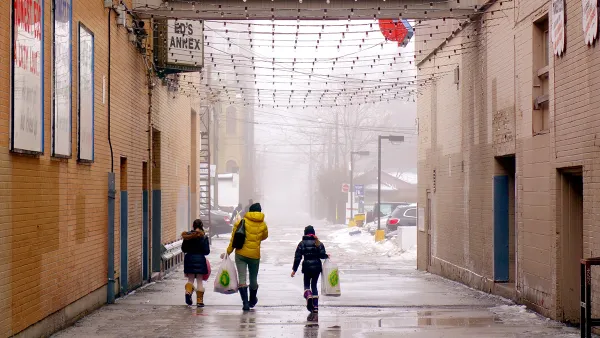
How Easy is Walking to the Grocery Store in Your City?
Angie Schmitt shares news of an effort by WalkScore to rank cities based on the ability of residents to access grocery stores on foot. WalkScore invites planners all over country to use their data to improve walkable access to food in cities.
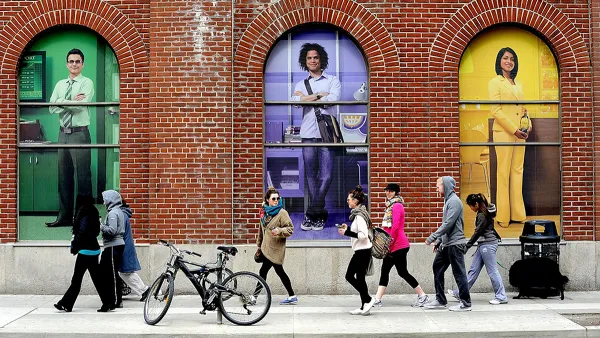
The Technology of Walkability
A recent article explores the promise—and potential pitfalls—of new technology to support the growing popularity of urban pedestrianism.
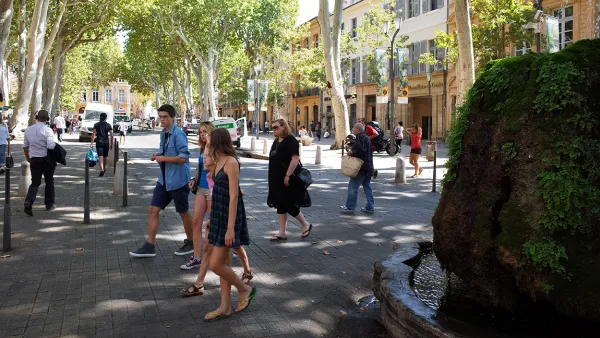
The Underlying Patterns of Urban Street Design
Based on empirical study, J. Alexander Maxwell and fellow University of Strathclyde researchers, in collaboration with Chuck Wolfe, argue for recalling historic patterns of pedestrian city settings in contemporary urban design and policies.
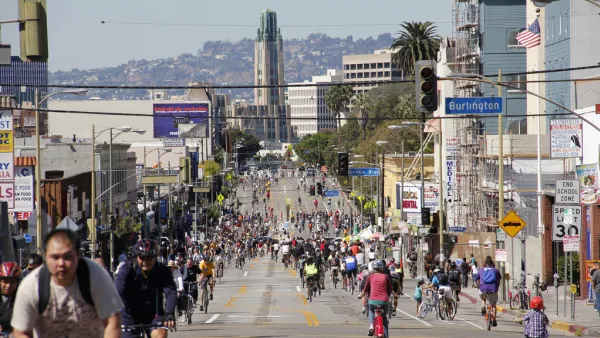
Can L.A.’s Streets Be Great? Deputy Mayor Rick Cole Opines
Los Angeles Deputy Mayor for Budget and Innovation Rick Cole shares his views on the critical ingredients necessary for the city to improve its thoroughfares at a Urban Land Institute-Los Angeles’ panel discussion titled "Can LA’s Streets Be Great?"
Dallas Warming Up to Complete Streets
A new Complete Streets Design Manual is under consideration in Dallas City Hall, but according to a recent article explaining Dallas' move toward walkable neighborhoods, the city has some work to do before the idea fully takes hold.
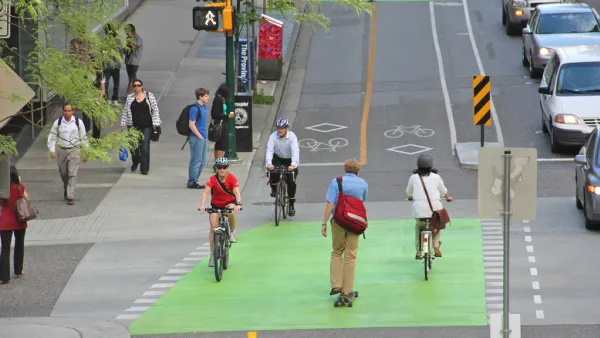
Economically Successful Cities Favor Space-Efficient Modes
Cities are, by definition, places where many people and activities locate close together. Their economic success and livability benefits from policies that favor space-efficient modes (walking, cycling, ridesharing and public transit).
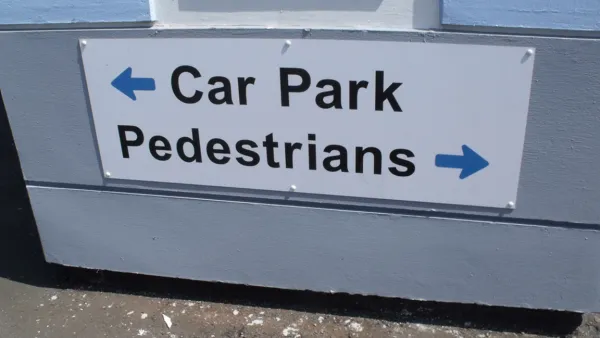
How Useful is Walkability: Are You Oriented to Walk?
The physical requirements for walkability—like narrow streets and wide sidewalks—aren't always enough to compel the activity of walking. How can we reorient toward the primal activity of walking?
Do Canada's Active, Outdoor Winters Breed Olympics Gold?
If you need a little misery-loves-company commiseration on winter, Hazel Borys shares some pics from Winnipeg, the coldest big city on earth. How this winter city deals with the polar vortex is something we may all need to get used to.
Researchers Link Density, Destinations to Active Transportation Habits
What, exactly, makes a neighborhood walkable? A new study published in the science journal PLOS-ONE begins to answer that question.
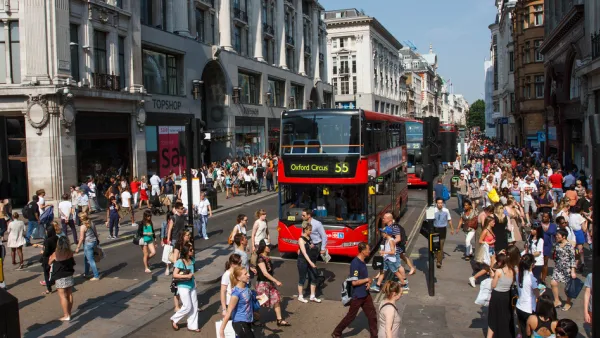
What Is 'Walkability,' Really?
Walkable developments are in demand, but what really makes a community "walkable"? It all boils down to three simple principles—physical access, proximity, and places—says John Lavey.
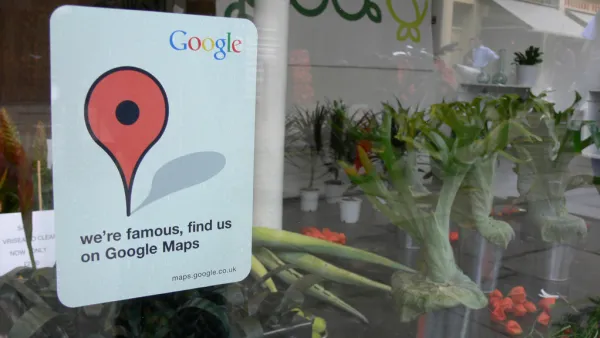
Location Optimization Tools: Toward More Comprehensive and Multi-Modal Indicators
New tools are becoming available to help people evaluate the quality of walking, cycling, public transit and automobile accessibility when making home location decisions. This information can help create more efficient and sustainable communities.
Sidewalk Survey is First Step Towards a More Walkable San Diego
Before San Diego can begin to fix its "busted sidewalks and busted sidewalk policies," the city is embarking on a high-tech $1 million effort to assess the quality of its pedestrian infrastructure.
To Become a "Great City", Miami Seeks to Boost Pedestrian-Friendliness
With the housing bust of the Great Recession fading in the rear-view mirror, a maturing Miami aspires to become one of the world's great cities. City leaders see the creation of a "Downtown Pedestrian Priority Zone" as the path to get them there.
Three Quick Wins for Auckland (or Any City’s) Walkability
The following “top three” relatively quick wins for a more walkable city, written below from the perspective of Brent’s observations, reflect some relatively low-cost opportunities toward a more liveable & successful Auckland.
Is Your City One of America's Most Walkable?
Walk Score has released its 2014 ranking of Most Walkable U.S. Cities and Neighborhoods. Though New York's position at the top of the list would be easy to explain, one surprise made the top five.
L.A.'s Sprawling Valley Undertakes a Pedestrian-Friendly Retrofit
The San Fernando Valley is infamous for its seemingly endless expanse of flat, gridded single-family sprawl. But to accommodate growth and improve the quality of life, the Valley's distinct neighborhoods are looking to create a sense of place.
Americans Pay More for Walkability
Preliminary results from a new study suggest that Americans are willing to pay about $850 more per Walk Score point when purchasing a home.

Why Suburban Sprawl is the Worst Idea America Has Ever Had
In a recent "TED Talk", Jeff Speck makes the case for creating a more walkable America based not on design arguments, but rather on the potential to create a more economically resilient, healthier, and environmentally sustainable country.
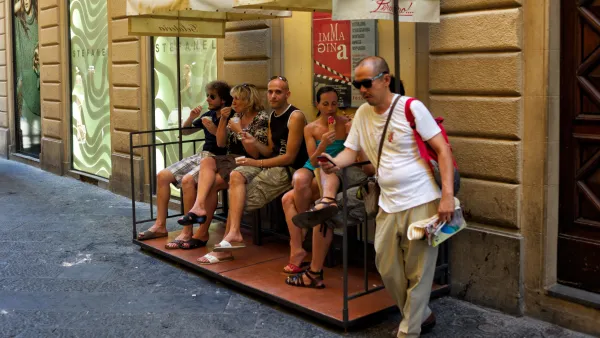
The Next Big Thing: "Sit-able Cities"
Supported by imagery of human urban conduct, Chuck Wolfe argues that walkable is good, but sit-able is better—and that "it’s time for the next big focal point and the next big idea, the 'Sit-able City'."
Why Walkability is a Civil Rights Issue
The NAACP is probably not the first advocacy group you think of when it comes to supporting walking and biking. But the civil rights organization encourages increasing physical activity in minority communities to help reduce childhood obesity.
Pagination
Urban Design for Planners 1: Software Tools
This six-course series explores essential urban design concepts using open source software and equips planners with the tools they need to participate fully in the urban design process.
Planning for Universal Design
Learn the tools for implementing Universal Design in planning regulations.
EMC Planning Group, Inc.
Planetizen
Planetizen
Mpact (formerly Rail~Volution)
Great Falls Development Authority, Inc.
HUDs Office of Policy Development and Research
NYU Wagner Graduate School of Public Service































